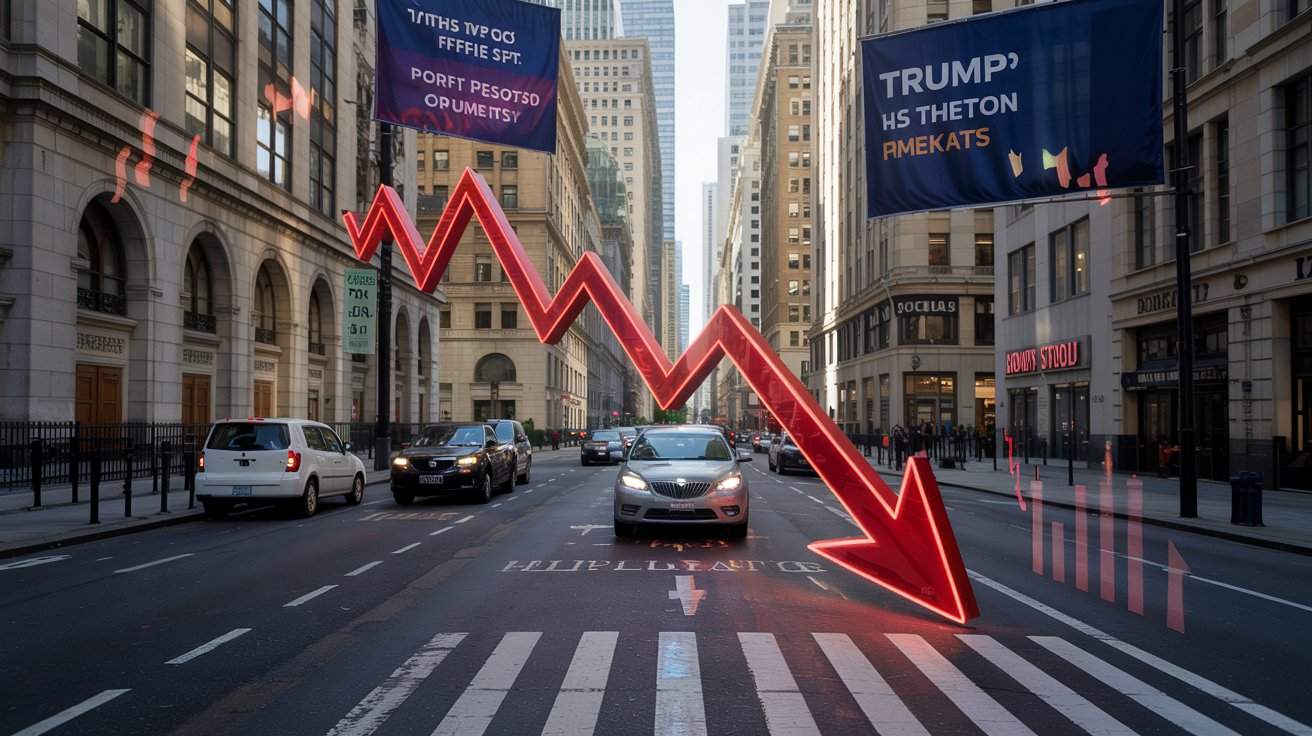U.S. Stocks Crash as Trump Unleashes Massive Import Tariffs—Markets in Turmoil!
Global financial markets are in freefall after President Donald Trump announced sweeping new import tariffs, triggering fears of an economic downturn and sending U.S. stock indexes into a steep decline. The Dow Jones Industrial Average plummeted by over 1,100 points, while the S&P 500 and Nasdaq Composite also suffered major losses. This article will break down the impact of these tariffs, explain key economic implications, and provide insights into what lies ahead for investors and businesses.
Trump’s Tariff Shock: What It Means for the Economy
President Trump’s new tariffs aim to reduce dependence on foreign imports, but they come with significant economic consequences. These measures include:
- A 10% levy on all imported goods
- A 34% tariff on Chinese imports
- A 20% tariff on European Union goods
- A 24% tariff on Japanese exports
How These Tariffs Affect the Economy
| Factor | Impact of Tariffs |
|---|---|
| Inflation | Higher prices on imported goods, leading to increased costs for consumers |
| Business Costs | Companies paying more for raw materials and manufacturing |
| GDP Growth | A potential decline of up to 2% due to reduced trade activity |
| Employment | Potential job losses in industries reliant on global supply chains |
| Consumer Spending | Decrease in spending power due to rising costs |
Why Markets Are Reacting Negatively
Investors fear these tariffs will hurt corporate profits, slow down global trade, and increase the likelihood of a recession. As a result, they have started selling off stocks, leading to market declines.
Global Markets React with Heavy Sell-offs
Stock markets worldwide have experienced significant losses. Here’s a closer look at how major indices are reacting:
- Dow Jones: Dropped over 1,100 points (-2.7%) in early trading.
- S&P 500: Declined by 2.5%, erasing weeks of gains.
- Nasdaq Composite: Experienced a 2.3% drop amid widespread tech stock sell-offs.
- European Markets: London’s FTSE 100 fell 1.8%, while Germany’s DAX dropped 2.2%.
- Asian Markets: The Nikkei 225 in Japan plummeted by 3.1%, with similar declines in Hong Kong and Shanghai.
These declines indicate a loss of investor confidence in global economic stability.
U.S. Dollar Drops as Investors Seek Safe Havens
As uncertainty rises, investors are shifting to safer assets such as gold, treasury bonds, and Swiss francs. The U.S. dollar has fallen to a six-month low, while gold prices have surged by 4% in the past 24 hours.
Gold vs. Oil Price Movement (Comparison)
| Asset | Current Trend | Reason |
| Gold | Rising (+4%) | Investors seeking safe assets |
| Oil | Declining (-2.5%) | Concerns over reduced global demand |
The movement in gold and oil prices further highlights fears of an economic downturn.
The Political and Economic Fallout
Political Reactions
Governments worldwide are now considering countermeasures. The European Union has hinted at retaliatory tariffs, while China is expected to respond with its own trade restrictions. Such actions could escalate tensions, leading to a full-scale trade war.
Economic Impact on U.S. Companies
Major corporations are already feeling the effects:
- Apple: Could face higher production costs for imported components.
- Boeing: Affected by potential retaliatory tariffs from China.
- General Motors: May need to increase car prices due to higher material costs.
According to the Wall Street Journal, top U.S. manufacturers are assessing how these tariffs will impact their business.
Where Do Markets Go From Here?
Experts predict that if trade tensions continue, the S&P 500 could see an additional 5-7% decline. The Federal Reserve may need to intervene with policy changes to stabilize the market.
Possible Future Scenarios
| Scenario | Market Response |
| Tariff rollback | Stocks recover; economic growth stabilizes |
| Increased trade tensions | Further market decline; recession risks rise |
| Federal Reserve intervention | Interest rate adjustments to stabilize the economy |
Conclusion: A Defining Moment for Global Trade
These tariffs represent a crucial moment for international trade and economic policy. If tensions escalate further, businesses, consumers, and policymakers will face serious challenges in the coming months. Investors should prepare for continued volatility.
This remains a developing story, and further updates are expected as world leaders respond to the economic fallout.
[USnewsSphere.com / wsj]





